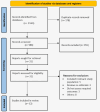The Comparison of the Effectiveness of Dapagliflozin and Empagliflozin in the Prevention of Cardiovascular Outcomes in Patients With Type 2 Diabetes: A Network Meta-Analysis
- PMID: 39429324
- PMCID: PMC11490073
- DOI: 10.7759/cureus.69711
The Comparison of the Effectiveness of Dapagliflozin and Empagliflozin in the Prevention of Cardiovascular Outcomes in Patients With Type 2 Diabetes: A Network Meta-Analysis
Abstract
Type 2 diabetes mellitus (T2DM) is a significant risk factor for cardiovascular diseases, prompting research into treatments that can mitigate this risk. Sodium-glucose cotransporter 2 (SGLT2) inhibitors, particularly dapagliflozin and empagliflozin, have shown promising cardiovascular benefits in T2DM patients. This meta-analysis aimed to directly compare the cardiovascular outcomes of these two drugs. To achieve this, we conducted a comprehensive literature search across multiple databases up to August 5, 2024, including both randomized controlled trials (RCTs) and observational studies. The primary outcomes of interest were major adverse cardiovascular events (MACE), atrial fibrillation (AF), cardiovascular mortality, myocardial infarction (MI), and hospitalization for heart failure (HF). Twelve studies met the inclusion criteria for this meta-analysis. The pooled analysis revealed several key findings. Notably, dapagliflozin demonstrated superior efficacy in preventing atrial fibrillation compared to empagliflozin. However, no significant differences were observed between the two drugs in terms of MACE, cardiovascular mortality, hospitalization for heart failure (HHF), or myocardial infarction. When compared to placebo, both dapagliflozin and empagliflozin showed greater effectiveness in preventing adverse cardiovascular outcomes in T2DM patients. These results reinforce the cardiovascular benefits of both dapagliflozin and empagliflozin in patients with T2DM. The comparable efficacy in most outcomes suggests that clinicians have flexibility in prescribing either of these SGLT2 inhibitors. However, the lower risk of atrial fibrillation associated with dapagliflozin may be a crucial factor in treatment decisions, especially for patients with a history of or at high risk for atrial fibrillation.
Keywords: cardiovascular outcomes; dapagliflozin; empagliflozin; systematic review and meta-analysis; type 2 diabetes mellitus.
Copyright © 2024, Sinha et al.
Conflict of interest statement
Conflicts of interest: In compliance with the ICMJE uniform disclosure form, all authors declare the following: Payment/services info: All authors have declared that no financial support was received from any organization for the submitted work. Financial relationships: All authors have declared that they have no financial relationships at present or within the previous three years with any organizations that might have an interest in the submitted work. Other relationships: All authors have declared that there are no other relationships or activities that could appear to have influenced the submitted work.
Figures






References
-
- Type 2 diabetes: demystifying the global epidemic. Unnikrishnan R, Pradeepa R, Joshi SR, Mohan V. Diabetes. 2017;66:1432–1442. - PubMed
-
- Mortality and cardiovascular disease in type 1 and type 2 diabetes. Rawshani A, Rawshani A, Franzén S, et al. N Engl J Med. 2017;376:1407–1418. - PubMed
-
- Impact of diabetes mellitus on hospitalization for heart failure, cardiovascular events, and death: outcomes at 4 years from the Reduction of Atherothrombosis for Continued Health (REACH) registry. Cavender MA, Steg PG, Smith SC Jr, et al. Circulation. 2015;132:923–931. - PubMed
-
- Reduction in ischemic events with ticagrelor in diabetic patients with prior myocardial infarction in PEGASUS-TIMI 54. Bhatt DL, Bonaca MP, Bansilal S, et al. J Am Coll Cardiol. 2016;67:2732–2740. - PubMed
-
- Cardiovascular safety and efficacy of the PCSK9 inhibitor evolocumab in patients with and without diabetes and the effect of evolocumab on glycaemia and risk of new-onset diabetes: a prespecified analysis of the FOURIER randomised controlled trial. Sabatine MS, Leiter LA, Wiviott SD, et al. Lancet Diabetes Endocrinol. 2017;5:941–950. - PubMed
Publication types
LinkOut - more resources
Full Text Sources
Research Materials
Miscellaneous
